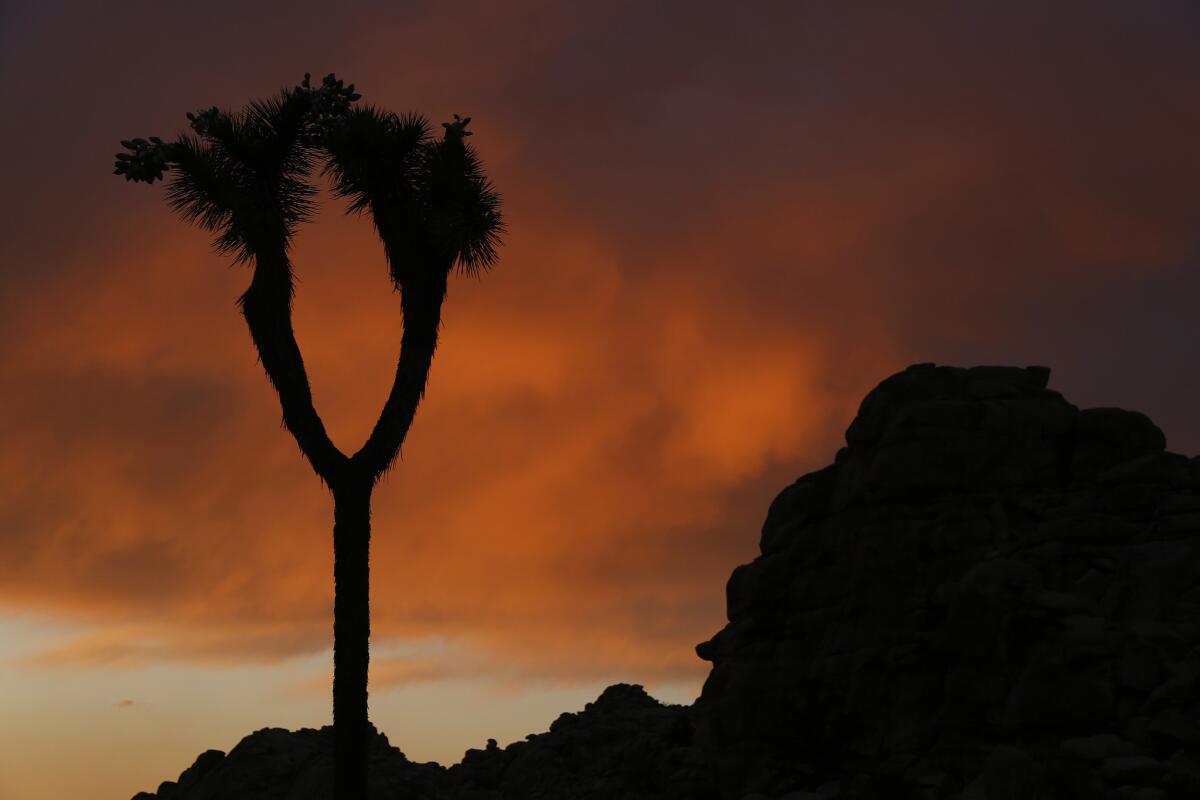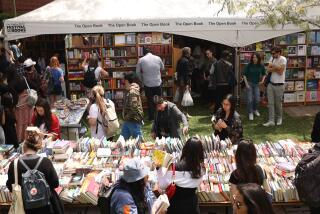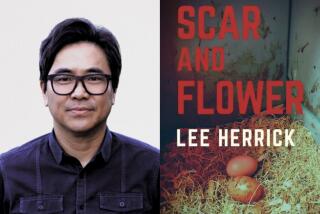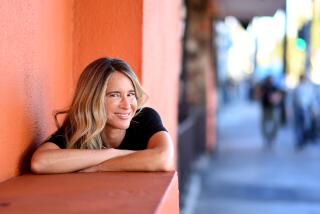Mojave Desert creates ideal climate for Laila Lalami’s story of immigrants

Born in Morocco, educated in London and Los Angeles, writer Laila Lalami found herself surprisingly drawn to the wild and unfamiliar landscape of the Mojave Desert.
Lalami chose the desert towns near Joshua Tree National Park as the backdrop for “The Other Americans,” the first novel she has set in California, her home for the past 20 years.
“I think what attracts me to the Mojave is the wide open spaces, the silence of it, and the fact that you have to look a bit closer to see the vibrant life it contains,” said Lalami, a Santa Monica resident who visits the desert frequently to hike, camp and write. “It requires that your senses be more acute.”
Lalami, a professor at UC Riverside and author of three previous books, will join the Los Angeles Times Book Club July 30 for a conversation about “The Other Americans.”
The novel opens with the mysterious hit-and-run death of a Moroccan immigrant outside his restaurant on Highway 62, the rural artery that runs along the northern edge of the park. The victim’s daughter Nora, who returns home from Oakland to grieve with her family, is certain that the death is no accident and presses authorities to track down the driver. The evidence is murky, but gradually the truth emerges through the voices of the nine characters who narrate the book, including the dead man, Driss, his family and an immigrant from Mexico who witnessed the crash but is afraid to come forward.
As an “immigrant by chance,” who settled here after falling in love as a graduate student at the University of Southern California, Lalami said she wanted to write a novel that explores the “unexpected consequences of immigration,” including the prejudice faced by outsiders in an insular community.
“If I were to set this book in a major city like L.A. it would be much more difficult for me to create the sense of psychological pressure — that it is somebody the family might know who might have been at the wheel of the vehicle,” she said in an interview.
The rural setting also offers a counterpoint to the idea that racial and ethnic diversity is something to be found only in coastal, urban areas.
“I think the idea that America is white or was white is really a myth,” Lalami said. Her previous novel, “The Moor’s Account,” a finalist for the Pulitzer Prize, exploded that myth in a historical novel. She told the story of a Moroccan slave, the first black explorer of America, known only from a brief reference in the official record.
Fast forward to the 21st century, and Lalami notes that there are parts of California’s Central Valley where you can find signs written in Punjabi. “These things do happen,” she said. “I don’t think that rural America is as homogeneous as people generally think.”
The story of “The Other Americans” is inextricably linked to the harsh landscape of the high desert, and the reader can easily picture the dark stretch of highway where the white car — or was it silver? — hit the restaurant owner and sped away. Later Nora tries to escape her grief in a tiny desert cabin that her father bought on a whim, where she finds comfort in the arms of an old high school friend with demons of his own.
Lalami said the book’s title reflects the fact that “pretty much every main character in the book is or has experienced some kind of displacement.”
“They are ordinary people, they are from a rural area, and they do have this sense that they are not in the center but more in the periphery,” she said. “And those feelings are exacerbated by the fact that some of them are not white or some of them are not Christians.”
While the book seems fitting for the current historical moment of increasingly xenophobic rhetoric, Lalami said she conceived of the story in 2014, “long before [President] Trump was even on the periphery of my consciousness.”
Lalami has written extensively about issues of race, gender and politics in her essays, and is working on a nonfiction book about the relationship between the state and its citizens, using the lens of her own experience. But “The Other Americans” was not intended to make a political statement, she said.
“I was mostly interested in exploring the experience of one very specific family,” she said. “I don’t have much of an agenda other than people read the story and enjoy going through it with the eyes of these characters.”
Book Club: If You Go
The Los Angeles Times Book Club welcomes author Laila Lalami in conversation with television writer Lorraine Ali.
When: 7:30 p.m. on Tuesday, July 30
Where: Skirball Cultural Center, 2701 N. Sepulveda Blvd., Los Angeles
Tickets: $15 for general admission; $60 for VIP package including the book, author reception, wine and reserved seating. Get tickets.
Info: latimes.com/bookclub
Bio: Laila Lalami
Born in: Rabat, Morocco, 1968
Lives in: Santa Monica
Educated at: Mohammed V University (Rabat, Morocco); University of London; University of Southern California (Ph.D., linguistics).
Professor at: UC Riverside (creative writing)
Author of: “The Other Americans” (2019); “The Moor’s Account” (2014); “Secret Son” (2009); “Hope and Other Dangerous Pursuits” (2005).
Awards include: Guggenheim Fellowship, Fulbright Fellowship, 500 Most Influential Muslims in the World (2015, 2017, 2018). “The Moor’s Account” won the American Book Award and was a finalist for the Pulitzer Prize.
Languages: Fluent in English, Arabic and French, conversational knowledge of Spanish, reading knowledge of Portuguese and Italian.
Website: lailalalami.com
More to Read
Sign up for our Book Club newsletter
Get the latest news, events and more from the Los Angeles Times Book Club, and help us get L.A. reading and talking.
You may occasionally receive promotional content from the Los Angeles Times.






